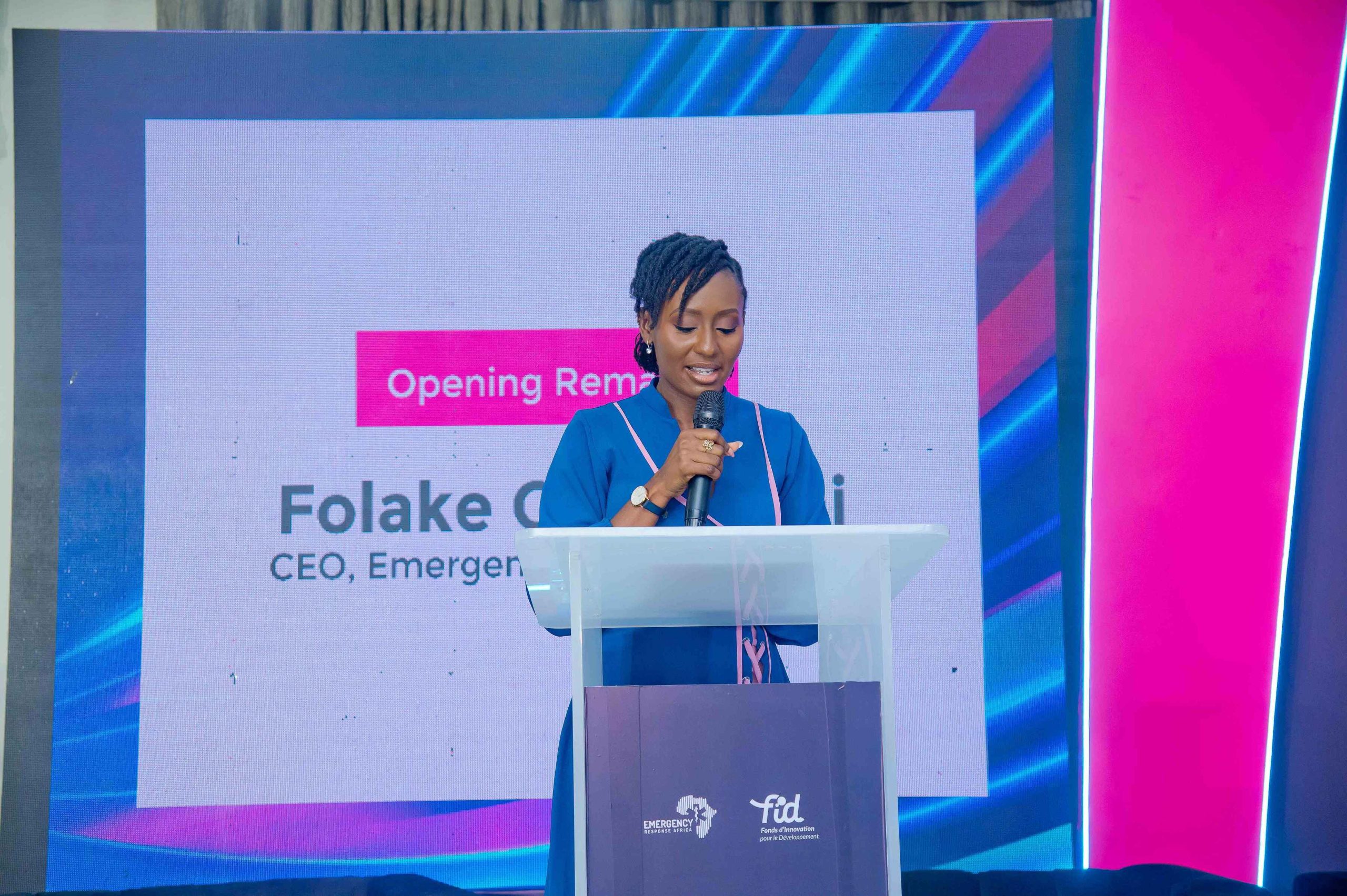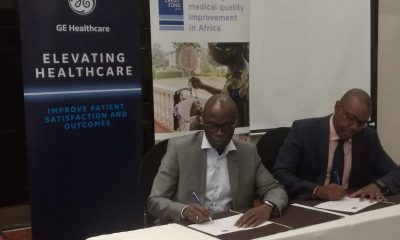Health
Destination Universal Health Coverage: Can PPPs be the vehicle to get us there?

PharmAccess Foundation’s journey in PPPs has shown significant promise and evidence of the organisation’s successful partnerships can be seen in the revitalised primary health centres in Lagos and Delta State. Photo source: PharmAccess Foundation
Almost everyone in Nigeria has directly or indirectly experienced the catastrophic impact of emergency out-of-pocket expenses on healthcare. We can no longer keep on doing the same thing – and hope for different outcomes – it is time to think differently and do things differently. It is time for strategic private sector engagement.
We all agree that the desired destination is Universal Health Coverage (UHC), i.e. ensuring that everyone in Nigeria has access to quality healthcare. As defined by the World Health Organisation (WHO), UHC means that “all people and communities can use the promotive, preventative, curative, rehabilitative and palliative health services they need, of sufficient quality to be effective, while also ensuring that the use of these services does not expose the user to financial hardship“.

Image credit: Nigeria Health Watch
The current state of the Nigerian health sector
The Nigerian health sector has suffered from chronic underfunding, 72.24% of current health expenditure is out-of-pocket, leaving patients to bear the burden of funding their own healthcare. This has led to sub-optimal healthcare delivery with many of our health indicators below national targets and international standards. Eighteen years after the Abuja Declaration where African Union states pledged to allocate at least 15% of their annual budget to health, Nigeria continues to default. Low budget allocation (and it is reducing rather than increasing) has crippled the Nigerian healthcare system in many ways. We forget that a healthy population is truly the best insurance we can have for our economy to thrive. Several studies have shown that investing in health leads to economic development.
If primary health care provides whole-person care for health needs throughout one’s lifespan, not just for a set of specific diseases, why do we neglect PHCs in Nigeria? Why do we still have wards that have no functional PHCs? Why do Nigerians visit secondary and tertiary health facilities for illnesses that should be treated at the primary level? This is likely because the primary healthcare system has failed them.
The important role of the private sector
There are competing demands on Nigeria’s national budget and health has not been given sufficient priority, leaving it underfunded. In a recent speech by Christine Lagarde, Managing Director of the International Monetary Fund (IMF), she stated that the Nigerian economy will struggle due to low revenue generation, given the country’s tax-to-GDP. This will have implications on the country’s ability to direct sufficient resources at the health sector and there is little hope that more funds will be made available to strengthen our already weak health infrastructure.
The role of the private sector is therefore critical in enabling improved access to health for all. It is clear that our public health system faces limitations, as it is not able to meet the healthcare needs of the population. The private sector, however, has the capacity to provide the technical efficiency required to deliver health services. Engagement of the private sector has, therefore, become critical as with the growing population in Nigeria, the public health sector is overcrowded and slow to innovate. Many initiatives have been tried to bolster the health sector and public-private partnerships (PPPs) in healthcare have emerged as a possible vehicle to enable the advancement towards UHC.
Yet, this is not an easy space. It is littered with failed projects and lost investments. It requires extensive thought leadership – an area that we at Nigeria Health Watch partnered with PharmAccess Foundation to address through a recent health policy dialogue.
PharmAccess Foundation – Systems transformation through PPPs
The private sector can play an important role in strengthening health systems in Nigeria. Through their expertise and capacity and PharmAccess Foundation has an integrated approach that focuses on the supply side of healthcare delivery, not just the demand side. The health policy dialogue on the 11th April 2019, organised by PharmAccess Foundation and Nigeria Health Watch, titled “Disrupting health care – PPPs as a model adoption for health system strengthening in Nigeria” highlighted PharmAccess Foundation’s journey in revitalising primary health care centres in Lagos through PPPs. This is not PharmAccess Foundation’s first foray into PPPs, the organisation had worked with Hygeia Community Health Care and the Kwara State Government on a PPP to develop the Kwara State Community Health Insurance Scheme, with the aim of providing affordable access to quality healthcare through the introduction of subsidised health insurance.

“Quality is not a pass or fail process in our own books. It is about improvement”, Ms. Njide Ndili, Country Director, PharmAccess Foundation. Photo source: PharmAccess Foundation

“All health PPP projects must consider dimensions of quality including technical competence, access to services, effectiveness, safety, efficiency and continuity”, Dr. Ibironke Dada, Director of Quality at PharmAccess Foundation. Photo source: PharmAccess Foundation

“Trust drives financial services. Trust drives lending. Trust is capital for the doctor and equipment supplier”, Mr. Olufisayo Okunsanya, Business Development Director of the Medical Credit Fund. Photo source: PharmAccess Foundation
What drives the lending system? Trust. Trust. Trust. Trustworthiness matters in all financial transactions; healthcare transactions are not excluded. At the policy dialogue, Mr. Olufisayo Okunsanya, Business Development Director of the Medical Credit Fund, explained how trust is key between all stakeholders and in its absence, lending does not occur. “Trust drives financial services. Trust drives lending. Trust is capital for the doctor and equipment supplier”, he said. In addition, when looking at the challenges in funding healthcare in Nigeria, the inconvenient truth is that the government cannot fund the infrastructure requirements of the health sector. The bulk of the federal government’s expenditure is spent on recurrent expenditure leaving little for capital expenditure.

“To ensure that adequate domestic resources are allocated to the health sector, dedicated analytic, policy, and advocacy efforts are required”, Dr. Olamide Okulaja, Director of Advocacy and Communications at PharmAccess Foundation. Photo source: PharmAccess Foundation
Healthcare needs to be seen as a business and only bankable ideas get funding. With PPPs you cannot do collateral borrowing and so the healthcare provider is borrowing against the future cash flow that will come from the business. This provides reassurance for the financing organisation for the loan will be repaid. We all have an enlightened self-interest, so it is in our best interest to fix healthcare in Nigeria and look for solutions outside of traditional government financing to address the funding challenges in healthcare.
Case study – Toronto Hospital brings healthcare to the Polobubo Community
How do you provide health care for a community left out of the health system for many years? That is the story of Polobubo, in Delta State, one of the most remote hard-to-reach communities in Nigeria. With a population of about 75,000 inhabitants, the community had until recently no access to healthcare due to their extreme isolation and remoteness. Accessing Polobubo through its closest town Warri, requires a 3hr 45mins boat ride, travelling with a 200-horsepower double engine speed boat, through the Niger Delta creeks, and across the Atlantic Ocean.

“We are breaking boundaries and getting healthcare to areas no one will dare”, Dr. Emeka Eze, Toronto Hospital. Photo source: PharmAccess Foundation
Now what? The Scalability of the PPP model in healthcare
In the 2019 health budget, about ₦50billion has been allocated for capital expenditure. Clearly, this amount is unable to cover the infrastructure gap in the healthcare industry and cater for the health needs of Nigeria’s burgeoning population of almost 200 million people. Can PPPs fill the gap in health funding? The government does not trust the private sector due to fear that they will put profit before performance, however, there appears to be a sea change. For the first time in Nigeria, two state governments are releasing funds to the private sector to revitalise some of their healthcare facilities. This is a testament to the political will in Lagos and Delta State to partner with the private sector.

The PPP model registered 2,639 enrolees who pay an annual premium of N7,000 and attended to 3,990 cases, including caesarean sections, minor surgeries, appendectomies in the Polobobo health facility, within two months of operation. Photo source: PharmAccess Foundation

The first panel at the policy dialogue focused on financing healthcare projects. Photo source: PharmAccess Foundation
Under the stewardship of Prof. Chris Bode, the Chief Medical Director at the Lagos University Teaching Hospital, a state of the art Cancer Centre was commissioned in partnership with a consortium that included the Nigeria Sovereign Investment Authority (NSIA) in February 2019.

The second panel at the policy dialogue focused on creating synergy for PPPs to strengthen primary healthcare delivery. Photo source: PharmAccess Foundation
A detailed report of the policy dialogue will be made available. Please contact info@nigeriahealthwatch.com for further details. If you would like to watch the live coverage of the event and see photo highlights, kindly visit our Facebook page. To view some of the presentations from the event, click here
Health
Revolutionizing Hospital Pharmacies: MedPharma’s COO on Financing, Efficiency and the Future of Drug Access in Nigeria

Yewande Adekoya is a Pharmacist and Healthcare Executive, currently serving as Chief Operating Officer/Head of Business at Medbury Pharmaceuticals. With over a decade of experience in business development, pharmacy management, and supply chain optimization, she has led strategic initiatives to enhance access to medicines, improve pharmaceutical care, and drive operational efficiency across Africa’s healthcare sector. At Medbury, she focuses on optimizing pharmacy and supply chain operations, reducing lost sales, and ensuring cost-effective access to quality medicines. Beyond her corporate leadership, Yewande has been instrumental in launching health-tech solutions, structuring mergers, and securing strategic partnerships to expand healthcare accessibility. In this exclusive interview with Alaba Ayinuola of Business Africa Online (BAO), Yewande speaks on MedPharma and its stock-financing model, quality assurance management, scaling MedPharma, and much more. Excerpts.
Alaba: What is MedPharma, and what inspired the creation of this model?
Yewande: MedPharma is a healthcare solutions company that provides pharmaceutical stock-financing for hospitals and healthcare providers in Nigeria. Our model addresses one of the biggest challenges in the healthcare system: lack of consistent access to essential medicines due to budget constraints. We were inspired by a simple question — What if hospitals never had to worry about upfront capital to stock their pharmacies? That question led us to create a model where we finance, stock, and manage hospital pharmacies entirely — with no upfront cost and no operational risk to the hospital.
Alaba: How exactly does MedPharma’s stock-financing model work for hospitals?
Yewande: Our model is simple but powerful. We finance 100% of the drug inventory and embed our operations team into the hospital pharmacy. This includes certified pharmacists, inventory software, and full logistics. We absorb all operational risk, manage procurement and distribution, and even return unsold or expired stock. Hospitals only pay once medicines are dispensed — and even better, they share in the profits. So, they earn revenue without tying up precious capital.
Alaba: What makes your model different from the traditional Drug Revolving Fund (DRF) system used in public hospitals?
Yewande: The DRF system requires hospitals to raise capital upfront, often from already overstretched budgets. It also exposes them to risks like stock expiry, theft, and poor forecasting. MedPharma’s model eliminates all of that. There’s zero upfront cost, no risk of dead stock, and our systems are built for transparency and efficiency. Think of us as a Public–Private Partnership (PPP) – we bring financing and expertise; hospitals retain control and benefit from consistent drug availability.
Alaba: How do you respond to concerns that outsourcing pharmacy operations may reduce transparency or hospital control?
Yewande: That’s actually a common myth. In reality, MedPharma operates strictly under hospital-approved Standard Operating Procedures. Pricing, formulary, and reporting structures are all jointly agreed upon with hospital management. Every transaction is digitally tracked, and weekly reports are shared transparently. The hospital retains full control, while we take on the heavy lifting behind the scenes.
Also, our model goes beyond end-to-end pharmacy management. A core strength of ours is supply chain optimization. Here, we streamline your backend operations covering inventory management, technology integration, and demand planning while you remain in charge of the front-end dispensary operations and patient interface. In this capacity, we can even serve as your silent, hidden partners, driving efficiency without disrupting your visibility or control.
Alaba: What results have your hospital partners seen so far?
Yewande: The impact has been remarkable. One partner hospital reported a 60% increase in pharmacy revenue within just one quarter of adopting our model. Another achieved less than 1% stock-outs over a six-month period.
Through our Pharmacy Benefit Program, we consistently maintain a 98–100% fulfilment rate. Even when a prescription cannot be fulfilled on-site, it is delivered directly to patients’ homes at no extra cost to the patient or the hospital.
For hospitals, this model has freed up significant capital. Funds once tied up in drug procurement have been reallocated to lab upgrades, staff training, and other critical investments.
For patients, the results are equally tangible: fewer delays, more prescriptions filled, and renewed trust in the healthcare system.
Alaba: How do you manage quality assurance, especially in a country where counterfeit drugs are still a major problem?
Yewande: As an ISO-certified company, quality control is at the core of our operations. All medicines we supply are NAFDAC-approved and WHO-certified generics or trusted brands, sourced directly from registered manufacturers. To further safeguard quality, we conduct periodic laboratory audits and independent batch testing. Our supply chain is deliberately structured to eliminate middlemen — reducing costs while also minimizing the risk of counterfeit products entering the system.
Alaba: What’s the most rewarding part of your work at MedPharma?
Yewande: For me, it’s walking into a hospital and seeing a fully stocked pharmacy, knowing that patients will get the care they need without delay. Or hearing from a hospital director who tells us they now have breathing room in their budget for the first time in years. We’re not just solving a logistics problem — we’re restoring dignity and efficiency to healthcare delivery.
Alaba: What’s next for MedPharma — are there plans to scale further?
Yewande: Absolutely. We are currently expanding our footprint across Nigeria and plan to onboard more state and federal facilities before the end of the year. We’re also investing in advanced inventory tech and analytics to further optimize drug availability. Our vision is bold: no hospital in Nigeria should ever experience a drug stock-out again — and we’re building the infrastructure to make that a reality.
Health
Ghana taps Zipline to maintain supply chain resilience amid USAID disruption

In the wake of ongoing disruptions to USAID’s supply chain, the Government of Ghana has partnered with Zipline, the world’s largest autonomous logistics system, to ensure uninterrupted access to essential health commodities, without adding a cedi to government spending. By leveraging Zipline’s existing network of autonomous drone delivery hubs, the government is reaching more patients than ever before while eliminating duplicative expenses long incurred by USAID.
In response to the recent stop-work order and the extended review of all USAID-funded programs, Ghanaian health authorities have swiftly prioritised the delivery of critical medical supplies through Zipline’s on-demand system. This includes a specific focus on malaria testing and treatment, which is critical amid growing concerns about the impact of climate change, including excessive rainfall and changes in weather patterns, which exacerbate the spread of malaria. Additionally included are medications for pain relief, cough, parasitic worms, and nutritional deficiencies. Each Zipline distribution hub is capable of hundreds of autonomous drone flights per day, providing the government with ample flexibility to absorb and deliver supplies currently sitting in warehouses across the country.
Zipline is supporting the delivery of these commodities across the Northeast, Northern, and Eastern Regions, with discussions underway to expand support to other parts of the country. Its rapid response to emerging needs across the health system enabled Zipline to scale deliveries at its various hubs by 20–50% in the last two months alone. Rather than navigating complex supply planning or rerouting, Regional Medical Stores centralised more products with Zipline, allowing on-demand deliveries to any patient, anywhere. By leveraging this flexible capacity, the government has significantly increased distribution volumes at no additional cost, while enabling system-wide savings by eliminating redundant logistics.
Commenting on the partnership, Comfort Addai Fofie, staff midwife, Jadema Health Centre, Northeast Region, remarked, “Zipline’s support in delivering essential medical supplies, including their recent delivery of some much-needed drugs to our facility, has been incredibly helpful in enabling us to discharge our duties effectively. Their timely deliveries and excellent collaboration have made a significant impact on our work. We’re truly grateful to the team for their continued efforts, they mean a lot to us in our line of duty”.
Daniel Kwaku Merki, Head of Zipline Ghana, said, “Ghana’s proactive approach to mobilising domestic resources and embracing innovative delivery solutions exemplifies its commitment to building a robust health system. This continued collaboration with Zipline is a clear example of how Ghana is transforming a challenging situation into an opportunity to build a more self-reliant and cost-effective health system – one that ensures critical care reaches every corner of the nation.”
By consolidating deliveries under Zipline’s existing partnership, which the government funds through a flat monthly fee for unlimited deliveries, Ghana can maximise its healthcare investments and ensure medical products reach communities more efficiently. This unified approach strengthens the nation’s health infrastructure, reinforces the Mahama Administration’s vision for economic growth and development, and ultimately delivers greater value for Ghanaian taxpayers.
Health
Emergency Care in Nigeria: Insights from Emergency Response Africa’s Inaugural Prehospital Emergency Care Stakeholder Summit.

In Nigeria, obtaining emergency medical assistance is a scarce privilege. There are only 0.4 ambulances available per 100,000 people, far below the WHO’s recommendation of one per 10,000. The stakes are exceptionally high for pregnant women and newborns, as more than 80% of maternal deaths in Nigeria could be avoided with timely intervention. It is against this stark reality that Emergency Response Africa (ERA) convened the inaugural Prehospital Emergency Care Stakeholder Summit, Beyond the Ambulance, in Lagos.
Inside the Four Points by Sheraton, healthcare executives, policymakers, emergency responders, and industry experts, recently gathered to address critical challenges in emergency care and explore solutions for a more efficient and responsive emergency care system in Nigeria.
The summit opened with a sense of urgency. “We cannot continue to treat emergency medical services as an afterthought in healthcare planning,” said Folake Owodunni, CEO of Emergency Response Africa. “Every second counts in an emergency and it is essential to create an ecosystem that ensures people get help when they need it most. Folake strongly advocates that strengthening emergency medical services has the potential to drastically reduce preventable deaths and improve timely access to medical care, especially in emergencies.
Her words resonated deeply with Dr. Benjamin Wachira, founder of the Emergency Medicine Kenya Foundation, who delivered the keynote address. “Africa needs a prehospital care system that integrates community engagement with technology. By training community members as first responders and leveraging digital tools for rapid response coordination, we can improve emergency care accessibility and efficiency” Dr. Benjamin emphasized.
54% of mortalities we get from emergencies can be averted if they had had pre-hospital care. says Dr. Tomi Coker, Honourable Commissioner for Health in Ogun State.
Before now, the focus of emergency healthcare has been within the facility and not pre-hospital, so the importance of this summit is that we are now having a conversation around what happens to accident victims or any medical emergency before getting to the hospital. Dr Tomi Coker outlined Ogun State’s recent efforts to combat maternal and neonatal mortality through the launch of the Maternal and Newborn Mortality Reduction Innovation and Initiative (MAMII), emphasizing the government’s commitment to enhancing maternal and newborn survival rates.
In Lagos, the most populous city in Africa, Permanent Secretary of the State’s Ministry of Health, Dr Olusegun Ogboye, says the state is working towards an emergency response system where there are available ambulances to attend to victims anywhere between 15 and 30 minutes before taking them to the hospital. As a state, emergency response is something we have a lot of passion for, it’s a cause we have been pushing for the last 4 or 5 years, and it’s the reason we are contributing to the Pre-hospital care conversation.
Amina Zakhnouf, Investment Officer at the Fund for Innovation in Development (FID), echoed the call for financial backing at the Summit disclosing that FID is committed to funding scalable solutions that save lives. We’ve partnered with Emergency Response Africa for the last 18 months, as a primary funder, we are pleased to be able to help them test and experiment with this new model of emergency care services, within Edo state. “At FID, innovation is key to solving some of the world’s most pressing challenges, including poverty, inequality, and access to emergency medical services.
While the discussions at the summit were inspiring, the obstacles remain daunting. Nigeria’s emergency medical services face numerous barriers: an absence of centralized emergency numbers, the lack of paramedics as a recognized health worker cadre, and an underdeveloped reimbursement framework that leaves EMS financing in a precarious state.
The summit highlighted innovative approaches already making an impact. Community-Based First Responder (CBFR) models, where trained volunteers provide immediate aid to emergency victims before paramedics and an ambulance arrive at the scene.
As the summit drew to a close, one message was clear: the time for theoretical discussions was over. It’s time for action. Public-private partnerships must be strengthened, regulatory frameworks must be established, and most importantly, emergency care must be accessible to all Nigerians—whether in Lagos or the most remote villages across Nigeria.
Folake’s final remarks underscored the urgency: “Every moment we delay, lives are lost. We must build a system that ensures emergency medical services are not a privilege but a right. In the last 18 months, we have done quite a bit of work across 3 different states in Nigeria and we have learned a lot of lessons that we believe can hold value as Nigeria journeys towards increased access to pre-hospital emergency care”
-

 Oil and Gas2 days ago
Oil and Gas2 days agoTotalEnergies, Chevron Push for Faster Permits, Better Seismic Data in Africa
-

 Afripreneur9 hours ago
Afripreneur9 hours agoRevolutionizing Cross-Border Payments in Africa: An Exclusive Interview with Onyinye Olisah
-

 Energy2 days ago
Energy2 days agoUnited States (U.S.) Political Will, African Reforms Signal New Era for Energy Investment



















